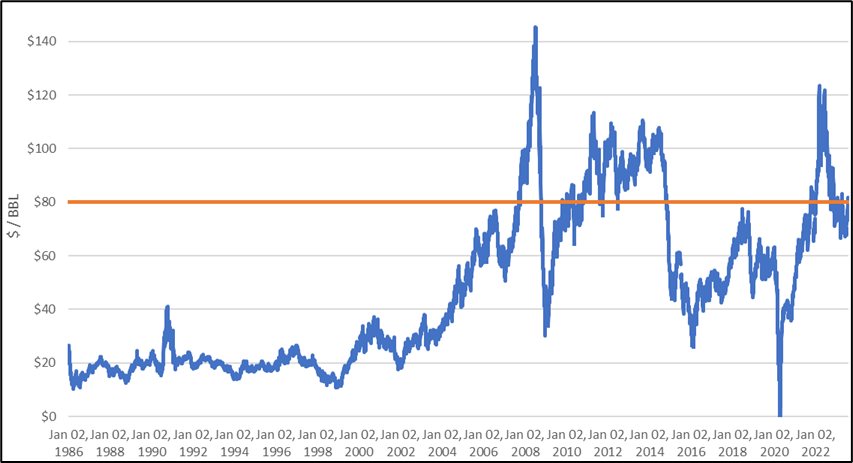2 choses notables : l'article de Campbell et Lahérrère était intitulé "The End of CHEAP oil" (la fin du pétrole bon marché) et pas "The End of Oil" (la fin du pétrole). Si on se réfère au prix du barilJeudi a écrit : ↑10 sept. 2024, 21:305 ans déjà
https://www.sciencedirect.com/science/a ... 9618303207Peak oil, 20 years later: Failed prediction or useful insight?
20 years ago, in 1998, Scientific American published a paper by Colin J. Campbell and Jean H. Laherrère titled “The End of Cheap Oil” [1], starting a debate on oil depletion continuing to the present day. It was the return of a viewpoint on oil depletion which had been proposed more than 40 years before by Marion King Hubbert [2] and, in later years, largely forgotten. In their paper, Campbell and Laherrère updated Hubbert’s model with new reserve estimates and proposed that the world’s crude oil production would peak around 2004–2005, and then start an irreversible decline. Shortly afterward, Colin Campbell proposed the term “peak oil” for the highest global oil production level. The term was to become popular over the following decade, generating a true movement of ideas sometimes called the “peak oil movement.” Today, these predictions turn out to have been only partially correct, mainly because the role of “non-conventional” oil was underestimated. The peak oil movement seems to have faded away, while the concept seems to have disappeared from the debate and to be commonly described has having been “wrong.” The present paper reviews the cycle of the peak oil movement, examining how the peak oil concept was understood with the public and the decision makers and what caused its diffusion and its demise, at least up to the present time.

on ne peut pas nier que depuis 2004, les prix ont été en moyenne bien supérieurs aux prix de 1998, ne tombant qu'exceptionnellement et brièvement en dessous de 40 $ au moment de crises violentes (crise de 2008, covid) alors qu'il était toujours inférieur avant 1998. Techniquement on peut dire qu'ils avaient raison. Le pétrole bon marché est fini. En revanche ça n'a pas eu les conséquences catastrophiques que certains prévoyaient, car l'économie a pu mieux supporter ces prix élevés que ce que certains croyaient, et ne s'est pas effondrée.
L'autre point c'est que l'article cité est sorti en 2019, et depuis, la courbe de production a à peine redepassé la valeur qu'elle avait à cette époque (il y a eu bien sur la chute du covid entre temps mais déjà la courbe était plate entre 2018 et 2019)

c'est assez ironique que ça pourrait etre au moment où on est très proche du pic qu'on écrit que la théorie est dépassée ...

